Nature's Influence on Nervous System Disorders
VerifiedAdded on 2019/12/28
|10
|3468
|224
Literature Review
AI Summary
The provided content explores the intersection of nature (genetic) and nurture (environmental) factors in shaping various disorders and behaviors. Studies on low back pain, food preferences, metabolic syndrome, externalizing problems, reading development, intelligence, galaxy group environment, dietary intake, ovarian cancer disparity, and striatal dopamine function demonstrate how both genetic and environmental influences interact to modulate these phenomena. The concept of epigenetics is highlighted as the link between nature and nurture, suggesting that environmental factors can affect gene expression and contribute to individual differences.
Contribute Materials
Your contribution can guide someone’s learning journey. Share your
documents today.
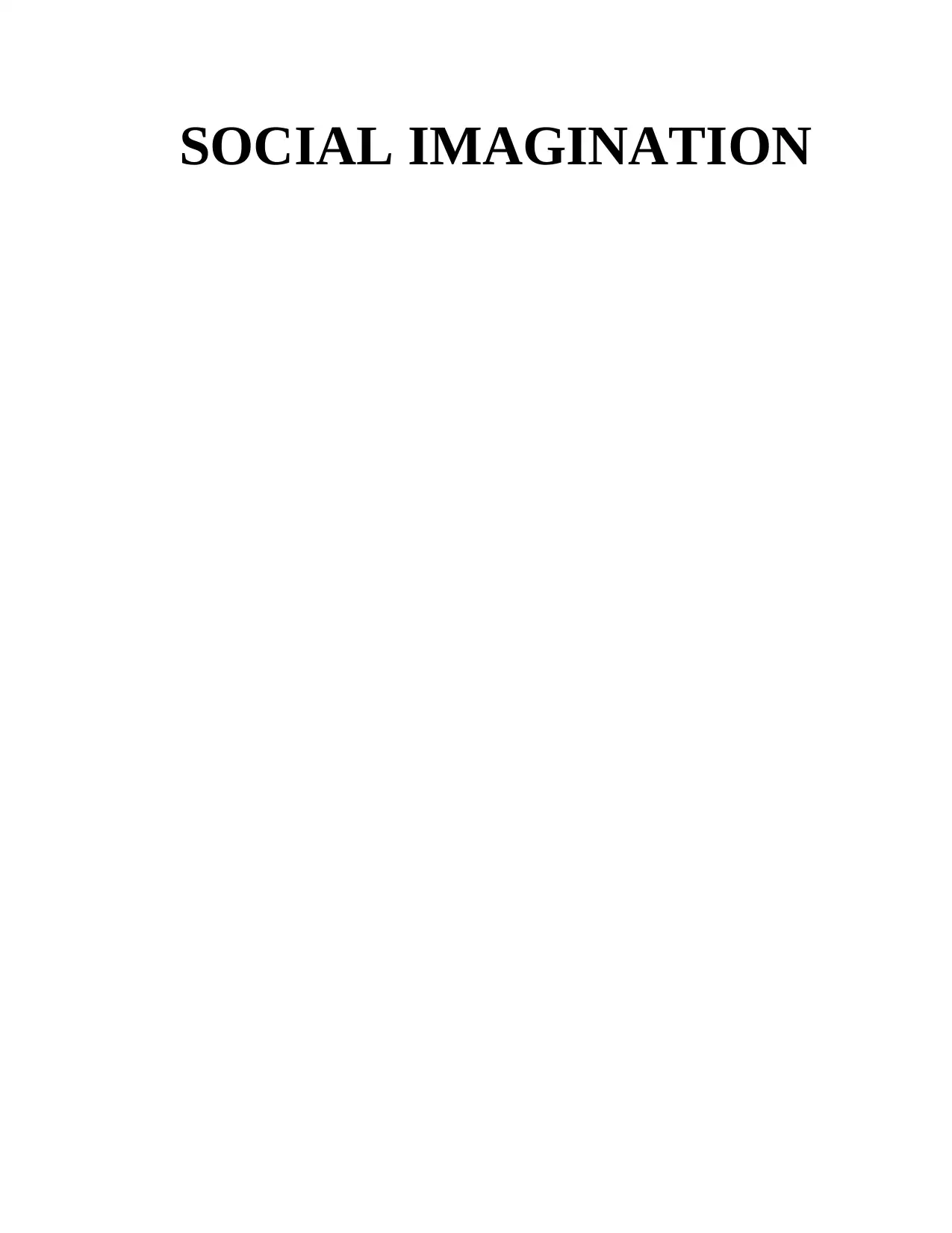
SOCIAL IMAGINATION
Secure Best Marks with AI Grader
Need help grading? Try our AI Grader for instant feedback on your assignments.
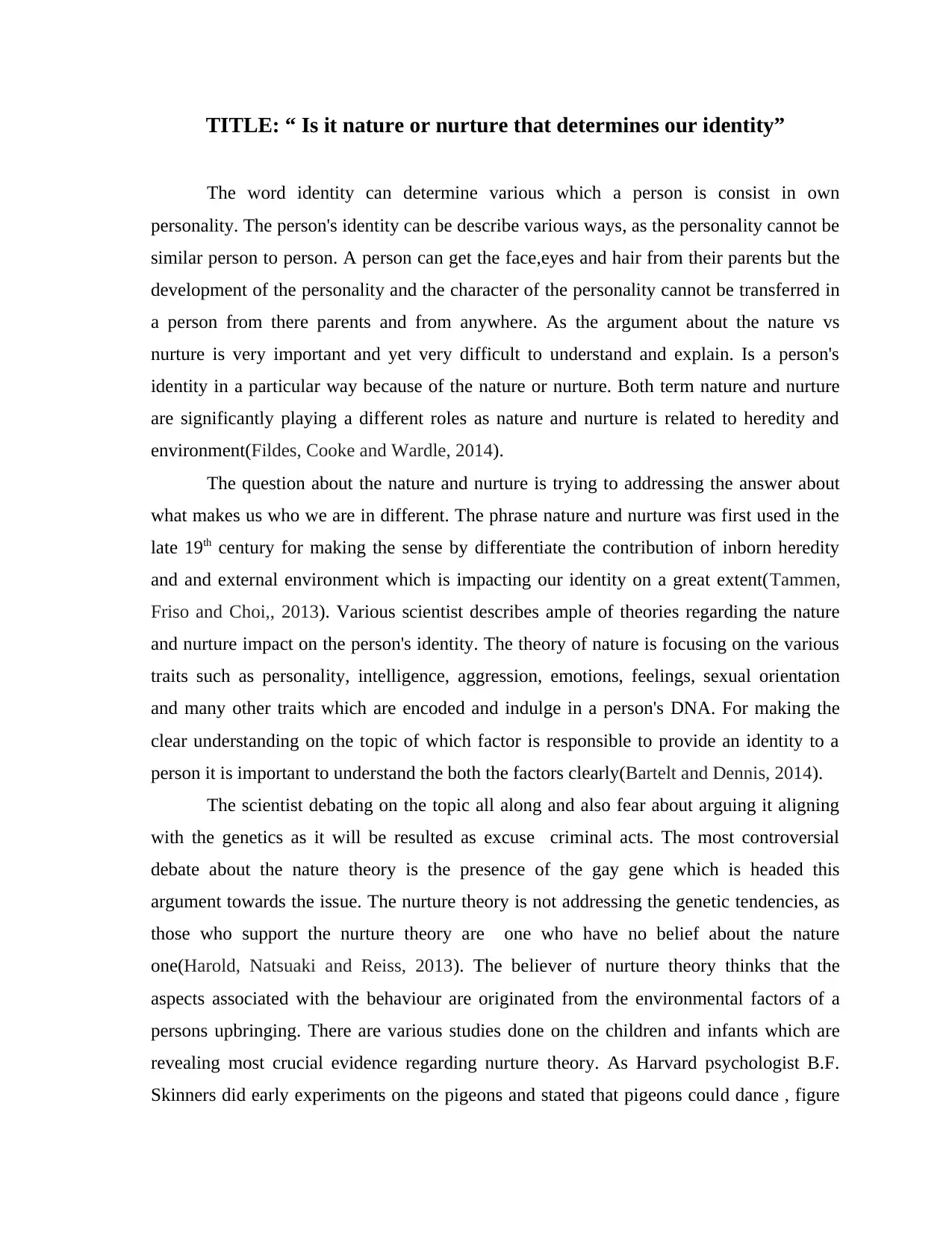
TITLE: “ Is it nature or nurture that determines our identity”
The word identity can determine various which a person is consist in own
personality. The person's identity can be describe various ways, as the personality cannot be
similar person to person. A person can get the face,eyes and hair from their parents but the
development of the personality and the character of the personality cannot be transferred in
a person from there parents and from anywhere. As the argument about the nature vs
nurture is very important and yet very difficult to understand and explain. Is a person's
identity in a particular way because of the nature or nurture. Both term nature and nurture
are significantly playing a different roles as nature and nurture is related to heredity and
environment(Fildes, Cooke and Wardle, 2014).
The question about the nature and nurture is trying to addressing the answer about
what makes us who we are in different. The phrase nature and nurture was first used in the
late 19th century for making the sense by differentiate the contribution of inborn heredity
and and external environment which is impacting our identity on a great extent(Tammen,
Friso and Choi,, 2013). Various scientist describes ample of theories regarding the nature
and nurture impact on the person's identity. The theory of nature is focusing on the various
traits such as personality, intelligence, aggression, emotions, feelings, sexual orientation
and many other traits which are encoded and indulge in a person's DNA. For making the
clear understanding on the topic of which factor is responsible to provide an identity to a
person it is important to understand the both the factors clearly(Bartelt and Dennis, 2014).
The scientist debating on the topic all along and also fear about arguing it aligning
with the genetics as it will be resulted as excuse criminal acts. The most controversial
debate about the nature theory is the presence of the gay gene which is headed this
argument towards the issue. The nurture theory is not addressing the genetic tendencies, as
those who support the nurture theory are one who have no belief about the nature
one(Harold, Natsuaki and Reiss, 2013). The believer of nurture theory thinks that the
aspects associated with the behaviour are originated from the environmental factors of a
persons upbringing. There are various studies done on the children and infants which are
revealing most crucial evidence regarding nurture theory. As Harvard psychologist B.F.
Skinners did early experiments on the pigeons and stated that pigeons could dance , figure
The word identity can determine various which a person is consist in own
personality. The person's identity can be describe various ways, as the personality cannot be
similar person to person. A person can get the face,eyes and hair from their parents but the
development of the personality and the character of the personality cannot be transferred in
a person from there parents and from anywhere. As the argument about the nature vs
nurture is very important and yet very difficult to understand and explain. Is a person's
identity in a particular way because of the nature or nurture. Both term nature and nurture
are significantly playing a different roles as nature and nurture is related to heredity and
environment(Fildes, Cooke and Wardle, 2014).
The question about the nature and nurture is trying to addressing the answer about
what makes us who we are in different. The phrase nature and nurture was first used in the
late 19th century for making the sense by differentiate the contribution of inborn heredity
and and external environment which is impacting our identity on a great extent(Tammen,
Friso and Choi,, 2013). Various scientist describes ample of theories regarding the nature
and nurture impact on the person's identity. The theory of nature is focusing on the various
traits such as personality, intelligence, aggression, emotions, feelings, sexual orientation
and many other traits which are encoded and indulge in a person's DNA. For making the
clear understanding on the topic of which factor is responsible to provide an identity to a
person it is important to understand the both the factors clearly(Bartelt and Dennis, 2014).
The scientist debating on the topic all along and also fear about arguing it aligning
with the genetics as it will be resulted as excuse criminal acts. The most controversial
debate about the nature theory is the presence of the gay gene which is headed this
argument towards the issue. The nurture theory is not addressing the genetic tendencies, as
those who support the nurture theory are one who have no belief about the nature
one(Harold, Natsuaki and Reiss, 2013). The believer of nurture theory thinks that the
aspects associated with the behaviour are originated from the environmental factors of a
persons upbringing. There are various studies done on the children and infants which are
revealing most crucial evidence regarding nurture theory. As Harvard psychologist B.F.
Skinners did early experiments on the pigeons and stated that pigeons could dance , figure
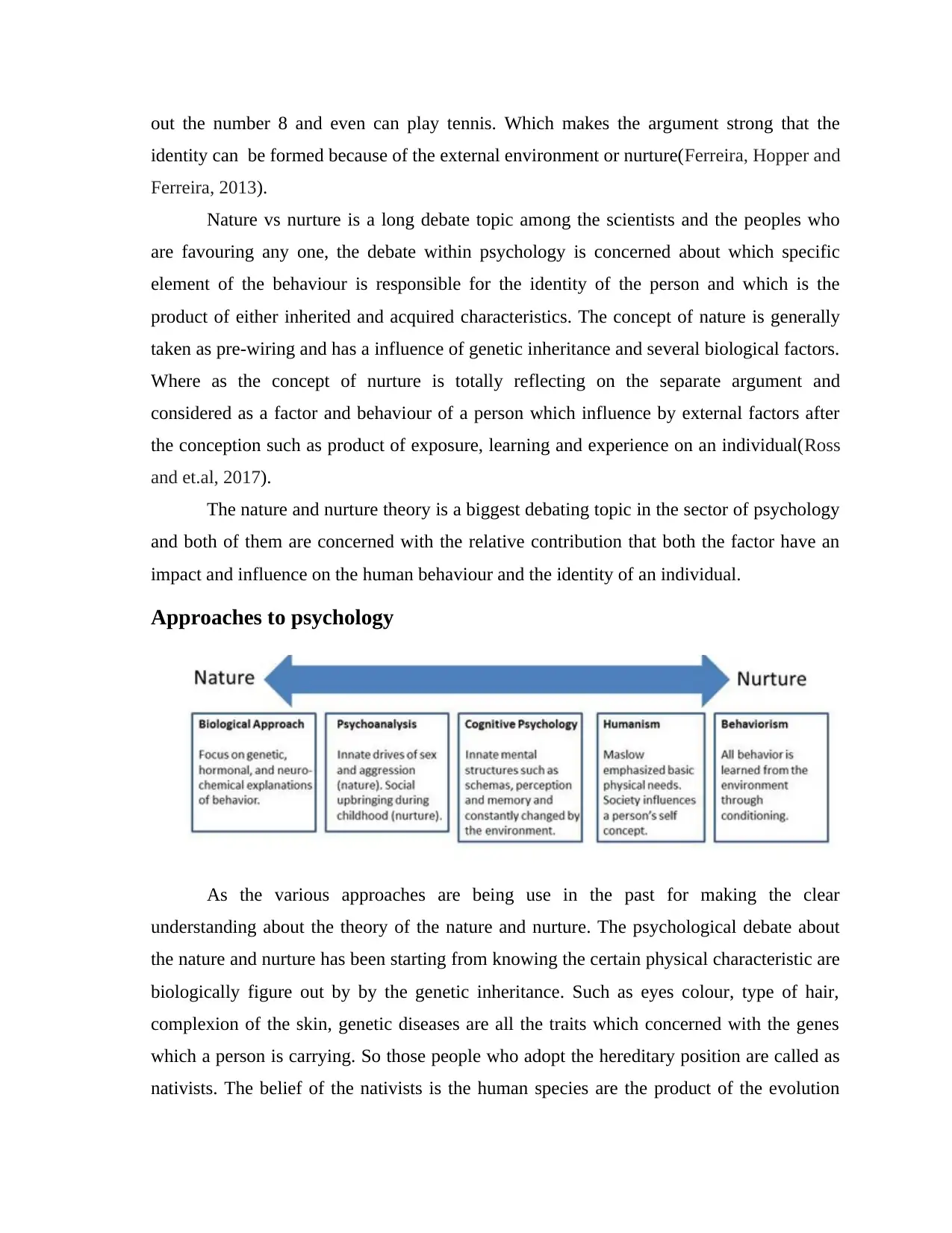
out the number 8 and even can play tennis. Which makes the argument strong that the
identity can be formed because of the external environment or nurture(Ferreira, Hopper and
Ferreira, 2013).
Nature vs nurture is a long debate topic among the scientists and the peoples who
are favouring any one, the debate within psychology is concerned about which specific
element of the behaviour is responsible for the identity of the person and which is the
product of either inherited and acquired characteristics. The concept of nature is generally
taken as pre-wiring and has a influence of genetic inheritance and several biological factors.
Where as the concept of nurture is totally reflecting on the separate argument and
considered as a factor and behaviour of a person which influence by external factors after
the conception such as product of exposure, learning and experience on an individual(Ross
and et.al, 2017).
The nature and nurture theory is a biggest debating topic in the sector of psychology
and both of them are concerned with the relative contribution that both the factor have an
impact and influence on the human behaviour and the identity of an individual.
Approaches to psychology
As the various approaches are being use in the past for making the clear
understanding about the theory of the nature and nurture. The psychological debate about
the nature and nurture has been starting from knowing the certain physical characteristic are
biologically figure out by by the genetic inheritance. Such as eyes colour, type of hair,
complexion of the skin, genetic diseases are all the traits which concerned with the genes
which a person is carrying. So those people who adopt the hereditary position are called as
nativists. The belief of the nativists is the human species are the product of the evolution
identity can be formed because of the external environment or nurture(Ferreira, Hopper and
Ferreira, 2013).
Nature vs nurture is a long debate topic among the scientists and the peoples who
are favouring any one, the debate within psychology is concerned about which specific
element of the behaviour is responsible for the identity of the person and which is the
product of either inherited and acquired characteristics. The concept of nature is generally
taken as pre-wiring and has a influence of genetic inheritance and several biological factors.
Where as the concept of nurture is totally reflecting on the separate argument and
considered as a factor and behaviour of a person which influence by external factors after
the conception such as product of exposure, learning and experience on an individual(Ross
and et.al, 2017).
The nature and nurture theory is a biggest debating topic in the sector of psychology
and both of them are concerned with the relative contribution that both the factor have an
impact and influence on the human behaviour and the identity of an individual.
Approaches to psychology
As the various approaches are being use in the past for making the clear
understanding about the theory of the nature and nurture. The psychological debate about
the nature and nurture has been starting from knowing the certain physical characteristic are
biologically figure out by by the genetic inheritance. Such as eyes colour, type of hair,
complexion of the skin, genetic diseases are all the traits which concerned with the genes
which a person is carrying. So those people who adopt the hereditary position are called as
nativists. The belief of the nativists is the human species are the product of the evolution
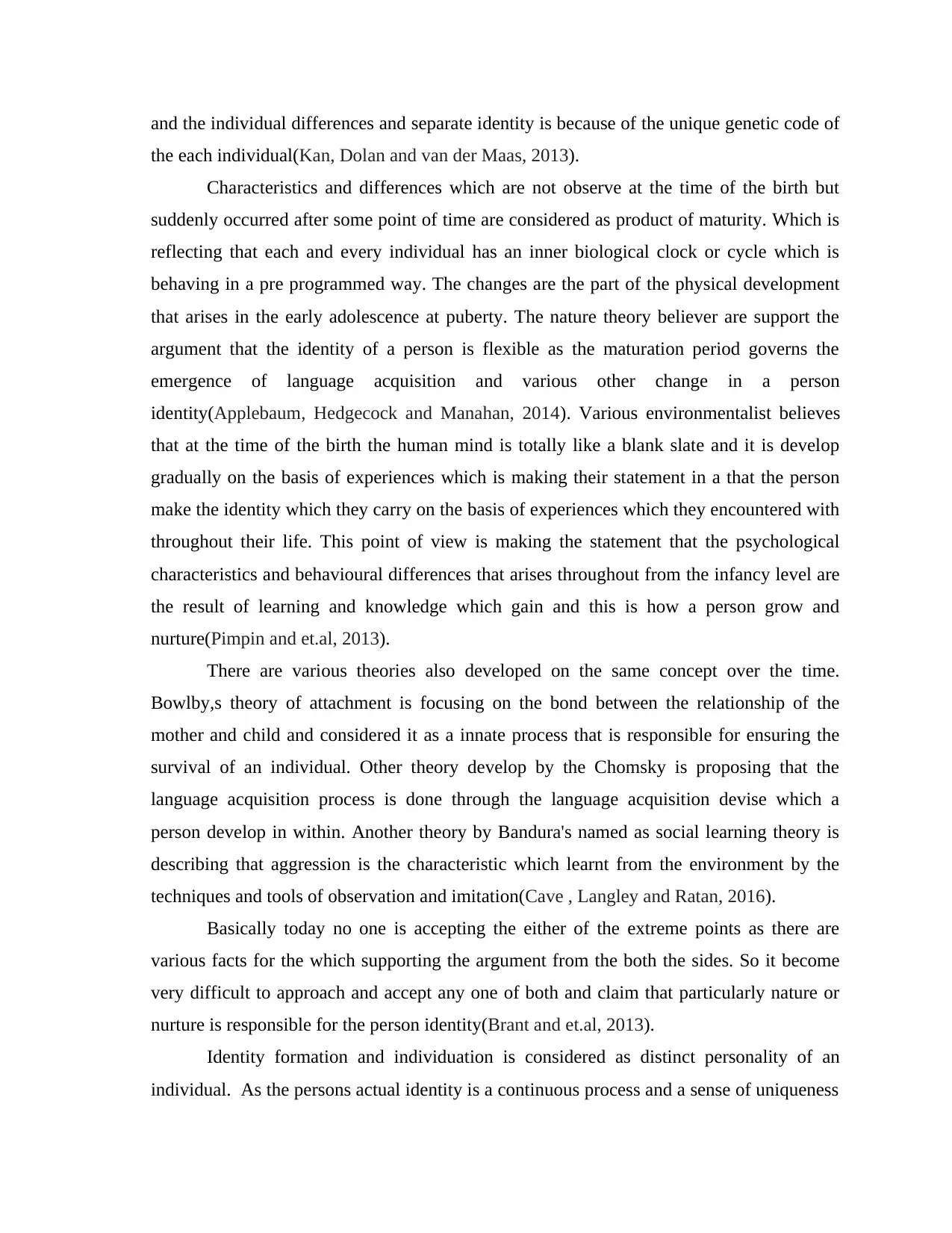
and the individual differences and separate identity is because of the unique genetic code of
the each individual(Kan, Dolan and van der Maas, 2013).
Characteristics and differences which are not observe at the time of the birth but
suddenly occurred after some point of time are considered as product of maturity. Which is
reflecting that each and every individual has an inner biological clock or cycle which is
behaving in a pre programmed way. The changes are the part of the physical development
that arises in the early adolescence at puberty. The nature theory believer are support the
argument that the identity of a person is flexible as the maturation period governs the
emergence of language acquisition and various other change in a person
identity(Applebaum, Hedgecock and Manahan, 2014). Various environmentalist believes
that at the time of the birth the human mind is totally like a blank slate and it is develop
gradually on the basis of experiences which is making their statement in a that the person
make the identity which they carry on the basis of experiences which they encountered with
throughout their life. This point of view is making the statement that the psychological
characteristics and behavioural differences that arises throughout from the infancy level are
the result of learning and knowledge which gain and this is how a person grow and
nurture(Pimpin and et.al, 2013).
There are various theories also developed on the same concept over the time.
Bowlby,s theory of attachment is focusing on the bond between the relationship of the
mother and child and considered it as a innate process that is responsible for ensuring the
survival of an individual. Other theory develop by the Chomsky is proposing that the
language acquisition process is done through the language acquisition devise which a
person develop in within. Another theory by Bandura's named as social learning theory is
describing that aggression is the characteristic which learnt from the environment by the
techniques and tools of observation and imitation(Cave , Langley and Ratan, 2016).
Basically today no one is accepting the either of the extreme points as there are
various facts for the which supporting the argument from the both the sides. So it become
very difficult to approach and accept any one of both and claim that particularly nature or
nurture is responsible for the person identity(Brant and et.al, 2013).
Identity formation and individuation is considered as distinct personality of an
individual. As the persons actual identity is a continuous process and a sense of uniqueness
the each individual(Kan, Dolan and van der Maas, 2013).
Characteristics and differences which are not observe at the time of the birth but
suddenly occurred after some point of time are considered as product of maturity. Which is
reflecting that each and every individual has an inner biological clock or cycle which is
behaving in a pre programmed way. The changes are the part of the physical development
that arises in the early adolescence at puberty. The nature theory believer are support the
argument that the identity of a person is flexible as the maturation period governs the
emergence of language acquisition and various other change in a person
identity(Applebaum, Hedgecock and Manahan, 2014). Various environmentalist believes
that at the time of the birth the human mind is totally like a blank slate and it is develop
gradually on the basis of experiences which is making their statement in a that the person
make the identity which they carry on the basis of experiences which they encountered with
throughout their life. This point of view is making the statement that the psychological
characteristics and behavioural differences that arises throughout from the infancy level are
the result of learning and knowledge which gain and this is how a person grow and
nurture(Pimpin and et.al, 2013).
There are various theories also developed on the same concept over the time.
Bowlby,s theory of attachment is focusing on the bond between the relationship of the
mother and child and considered it as a innate process that is responsible for ensuring the
survival of an individual. Other theory develop by the Chomsky is proposing that the
language acquisition process is done through the language acquisition devise which a
person develop in within. Another theory by Bandura's named as social learning theory is
describing that aggression is the characteristic which learnt from the environment by the
techniques and tools of observation and imitation(Cave , Langley and Ratan, 2016).
Basically today no one is accepting the either of the extreme points as there are
various facts for the which supporting the argument from the both the sides. So it become
very difficult to approach and accept any one of both and claim that particularly nature or
nurture is responsible for the person identity(Brant and et.al, 2013).
Identity formation and individuation is considered as distinct personality of an
individual. As the persons actual identity is a continuous process and a sense of uniqueness
Secure Best Marks with AI Grader
Need help grading? Try our AI Grader for instant feedback on your assignments.
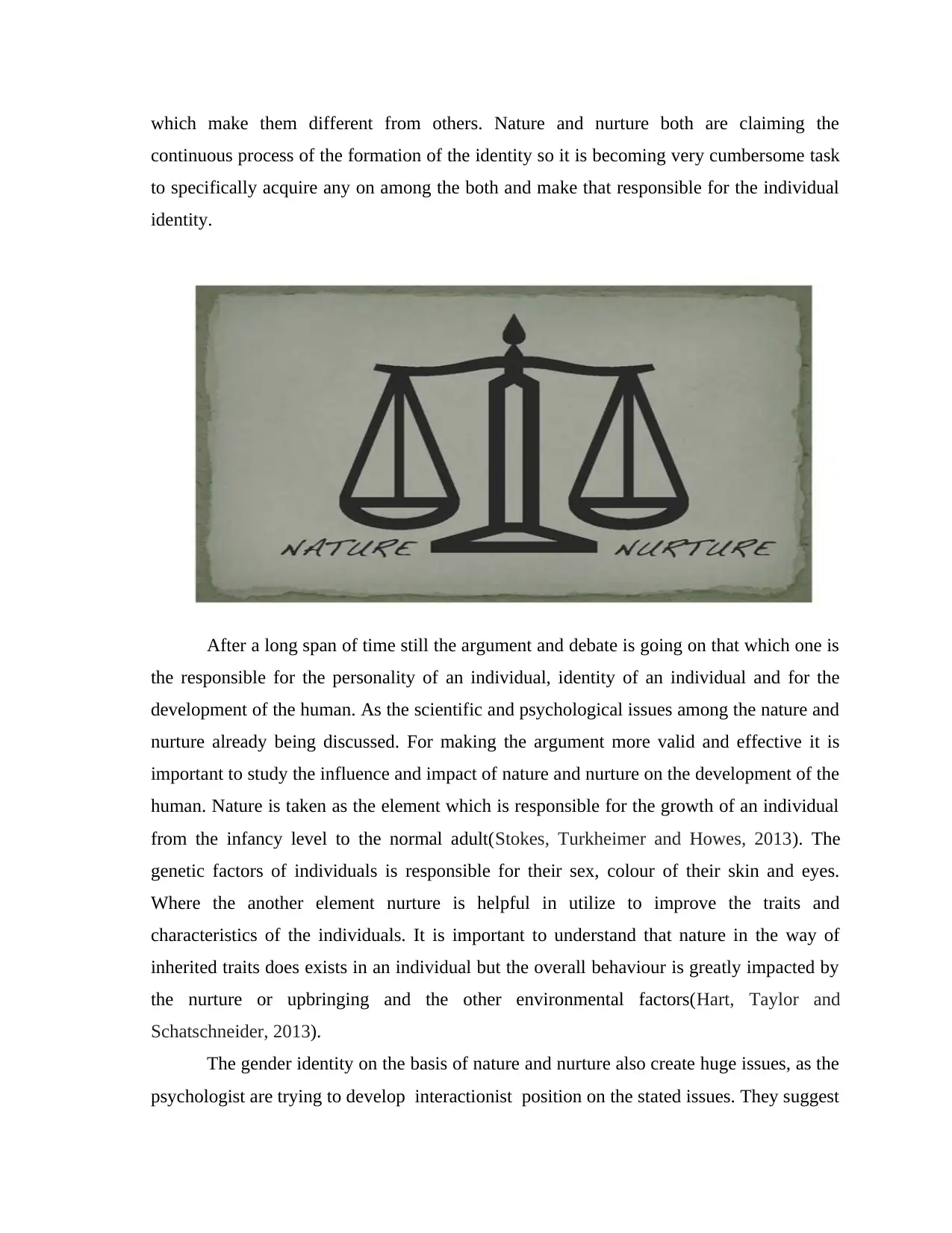
which make them different from others. Nature and nurture both are claiming the
continuous process of the formation of the identity so it is becoming very cumbersome task
to specifically acquire any on among the both and make that responsible for the individual
identity.
After a long span of time still the argument and debate is going on that which one is
the responsible for the personality of an individual, identity of an individual and for the
development of the human. As the scientific and psychological issues among the nature and
nurture already being discussed. For making the argument more valid and effective it is
important to study the influence and impact of nature and nurture on the development of the
human. Nature is taken as the element which is responsible for the growth of an individual
from the infancy level to the normal adult(Stokes, Turkheimer and Howes, 2013). The
genetic factors of individuals is responsible for their sex, colour of their skin and eyes.
Where the another element nurture is helpful in utilize to improve the traits and
characteristics of the individuals. It is important to understand that nature in the way of
inherited traits does exists in an individual but the overall behaviour is greatly impacted by
the nurture or upbringing and the other environmental factors(Hart, Taylor and
Schatschneider, 2013).
The gender identity on the basis of nature and nurture also create huge issues, as the
psychologist are trying to develop interactionist position on the stated issues. They suggest
continuous process of the formation of the identity so it is becoming very cumbersome task
to specifically acquire any on among the both and make that responsible for the individual
identity.
After a long span of time still the argument and debate is going on that which one is
the responsible for the personality of an individual, identity of an individual and for the
development of the human. As the scientific and psychological issues among the nature and
nurture already being discussed. For making the argument more valid and effective it is
important to study the influence and impact of nature and nurture on the development of the
human. Nature is taken as the element which is responsible for the growth of an individual
from the infancy level to the normal adult(Stokes, Turkheimer and Howes, 2013). The
genetic factors of individuals is responsible for their sex, colour of their skin and eyes.
Where the another element nurture is helpful in utilize to improve the traits and
characteristics of the individuals. It is important to understand that nature in the way of
inherited traits does exists in an individual but the overall behaviour is greatly impacted by
the nurture or upbringing and the other environmental factors(Hart, Taylor and
Schatschneider, 2013).
The gender identity on the basis of nature and nurture also create huge issues, as the
psychologist are trying to develop interactionist position on the stated issues. They suggest
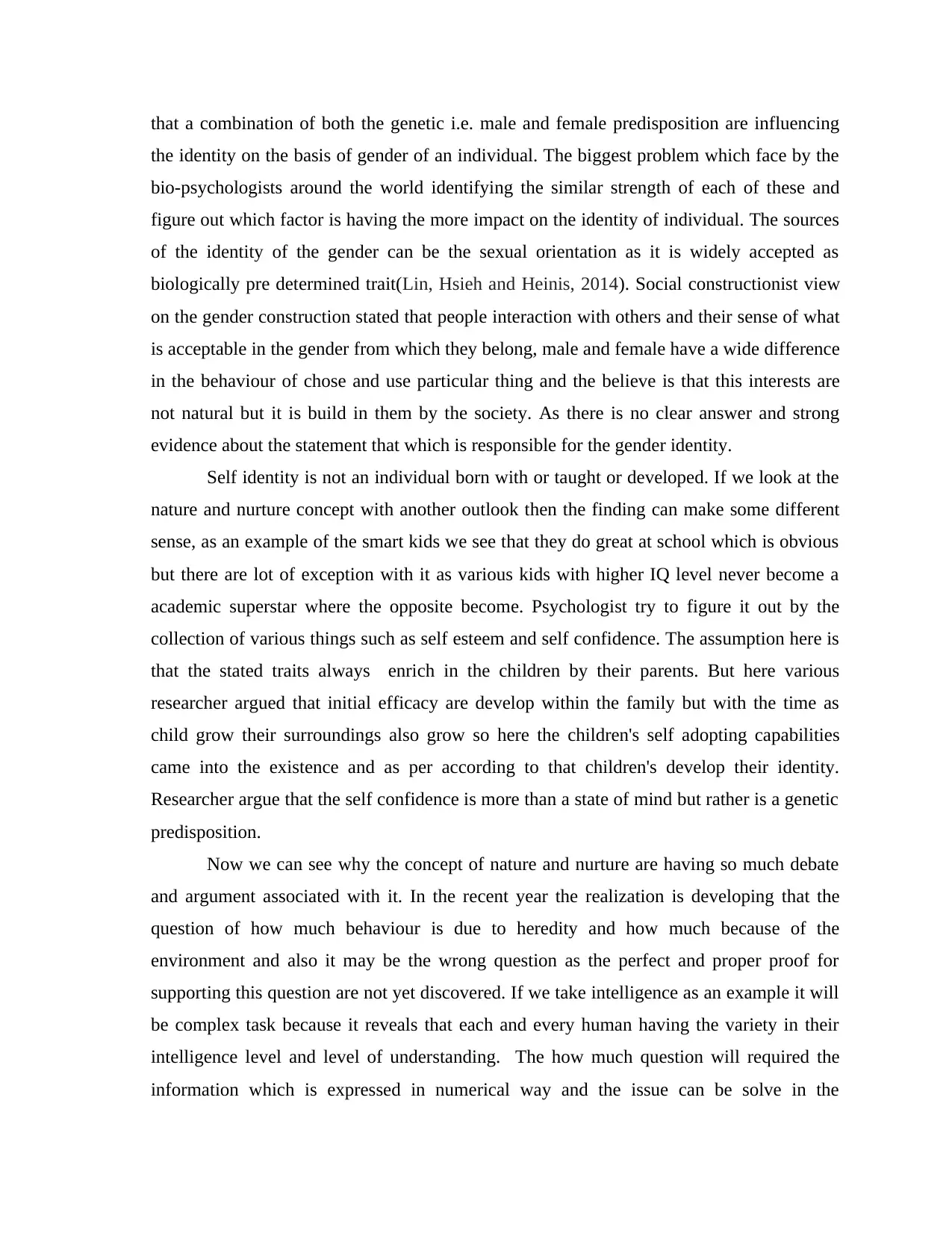
that a combination of both the genetic i.e. male and female predisposition are influencing
the identity on the basis of gender of an individual. The biggest problem which face by the
bio-psychologists around the world identifying the similar strength of each of these and
figure out which factor is having the more impact on the identity of individual. The sources
of the identity of the gender can be the sexual orientation as it is widely accepted as
biologically pre determined trait(Lin, Hsieh and Heinis, 2014). Social constructionist view
on the gender construction stated that people interaction with others and their sense of what
is acceptable in the gender from which they belong, male and female have a wide difference
in the behaviour of chose and use particular thing and the believe is that this interests are
not natural but it is build in them by the society. As there is no clear answer and strong
evidence about the statement that which is responsible for the gender identity.
Self identity is not an individual born with or taught or developed. If we look at the
nature and nurture concept with another outlook then the finding can make some different
sense, as an example of the smart kids we see that they do great at school which is obvious
but there are lot of exception with it as various kids with higher IQ level never become a
academic superstar where the opposite become. Psychologist try to figure it out by the
collection of various things such as self esteem and self confidence. The assumption here is
that the stated traits always enrich in the children by their parents. But here various
researcher argued that initial efficacy are develop within the family but with the time as
child grow their surroundings also grow so here the children's self adopting capabilities
came into the existence and as per according to that children's develop their identity.
Researcher argue that the self confidence is more than a state of mind but rather is a genetic
predisposition.
Now we can see why the concept of nature and nurture are having so much debate
and argument associated with it. In the recent year the realization is developing that the
question of how much behaviour is due to heredity and how much because of the
environment and also it may be the wrong question as the perfect and proper proof for
supporting this question are not yet discovered. If we take intelligence as an example it will
be complex task because it reveals that each and every human having the variety in their
intelligence level and level of understanding. The how much question will required the
information which is expressed in numerical way and the issue can be solve in the
the identity on the basis of gender of an individual. The biggest problem which face by the
bio-psychologists around the world identifying the similar strength of each of these and
figure out which factor is having the more impact on the identity of individual. The sources
of the identity of the gender can be the sexual orientation as it is widely accepted as
biologically pre determined trait(Lin, Hsieh and Heinis, 2014). Social constructionist view
on the gender construction stated that people interaction with others and their sense of what
is acceptable in the gender from which they belong, male and female have a wide difference
in the behaviour of chose and use particular thing and the believe is that this interests are
not natural but it is build in them by the society. As there is no clear answer and strong
evidence about the statement that which is responsible for the gender identity.
Self identity is not an individual born with or taught or developed. If we look at the
nature and nurture concept with another outlook then the finding can make some different
sense, as an example of the smart kids we see that they do great at school which is obvious
but there are lot of exception with it as various kids with higher IQ level never become a
academic superstar where the opposite become. Psychologist try to figure it out by the
collection of various things such as self esteem and self confidence. The assumption here is
that the stated traits always enrich in the children by their parents. But here various
researcher argued that initial efficacy are develop within the family but with the time as
child grow their surroundings also grow so here the children's self adopting capabilities
came into the existence and as per according to that children's develop their identity.
Researcher argue that the self confidence is more than a state of mind but rather is a genetic
predisposition.
Now we can see why the concept of nature and nurture are having so much debate
and argument associated with it. In the recent year the realization is developing that the
question of how much behaviour is due to heredity and how much because of the
environment and also it may be the wrong question as the perfect and proper proof for
supporting this question are not yet discovered. If we take intelligence as an example it will
be complex task because it reveals that each and every human having the variety in their
intelligence level and level of understanding. The how much question will required the
information which is expressed in numerical way and the issue can be solve in the
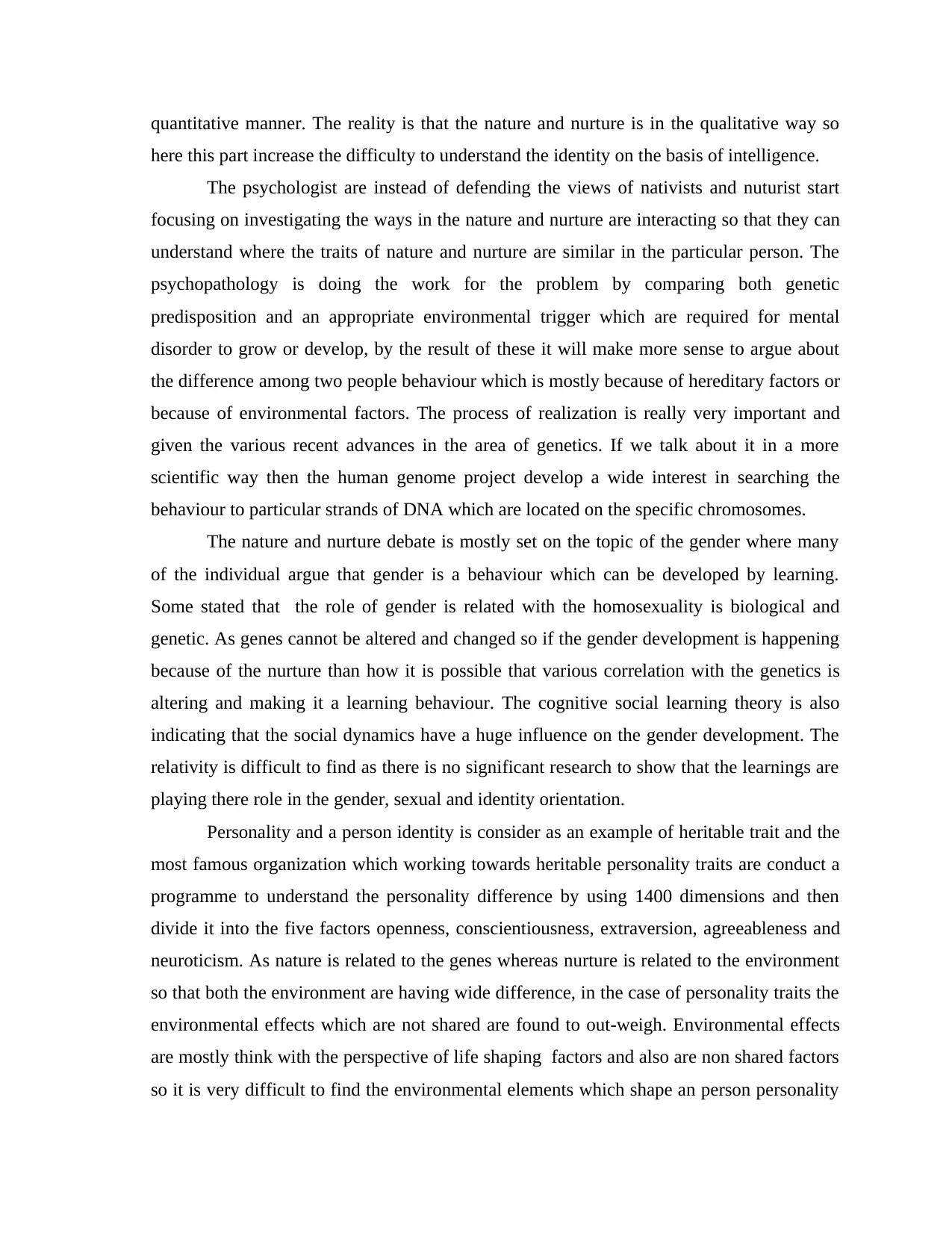
quantitative manner. The reality is that the nature and nurture is in the qualitative way so
here this part increase the difficulty to understand the identity on the basis of intelligence.
The psychologist are instead of defending the views of nativists and nuturist start
focusing on investigating the ways in the nature and nurture are interacting so that they can
understand where the traits of nature and nurture are similar in the particular person. The
psychopathology is doing the work for the problem by comparing both genetic
predisposition and an appropriate environmental trigger which are required for mental
disorder to grow or develop, by the result of these it will make more sense to argue about
the difference among two people behaviour which is mostly because of hereditary factors or
because of environmental factors. The process of realization is really very important and
given the various recent advances in the area of genetics. If we talk about it in a more
scientific way then the human genome project develop a wide interest in searching the
behaviour to particular strands of DNA which are located on the specific chromosomes.
The nature and nurture debate is mostly set on the topic of the gender where many
of the individual argue that gender is a behaviour which can be developed by learning.
Some stated that the role of gender is related with the homosexuality is biological and
genetic. As genes cannot be altered and changed so if the gender development is happening
because of the nurture than how it is possible that various correlation with the genetics is
altering and making it a learning behaviour. The cognitive social learning theory is also
indicating that the social dynamics have a huge influence on the gender development. The
relativity is difficult to find as there is no significant research to show that the learnings are
playing there role in the gender, sexual and identity orientation.
Personality and a person identity is consider as an example of heritable trait and the
most famous organization which working towards heritable personality traits are conduct a
programme to understand the personality difference by using 1400 dimensions and then
divide it into the five factors openness, conscientiousness, extraversion, agreeableness and
neuroticism. As nature is related to the genes whereas nurture is related to the environment
so that both the environment are having wide difference, in the case of personality traits the
environmental effects which are not shared are found to out-weigh. Environmental effects
are mostly think with the perspective of life shaping factors and also are non shared factors
so it is very difficult to find the environmental elements which shape an person personality
here this part increase the difficulty to understand the identity on the basis of intelligence.
The psychologist are instead of defending the views of nativists and nuturist start
focusing on investigating the ways in the nature and nurture are interacting so that they can
understand where the traits of nature and nurture are similar in the particular person. The
psychopathology is doing the work for the problem by comparing both genetic
predisposition and an appropriate environmental trigger which are required for mental
disorder to grow or develop, by the result of these it will make more sense to argue about
the difference among two people behaviour which is mostly because of hereditary factors or
because of environmental factors. The process of realization is really very important and
given the various recent advances in the area of genetics. If we talk about it in a more
scientific way then the human genome project develop a wide interest in searching the
behaviour to particular strands of DNA which are located on the specific chromosomes.
The nature and nurture debate is mostly set on the topic of the gender where many
of the individual argue that gender is a behaviour which can be developed by learning.
Some stated that the role of gender is related with the homosexuality is biological and
genetic. As genes cannot be altered and changed so if the gender development is happening
because of the nurture than how it is possible that various correlation with the genetics is
altering and making it a learning behaviour. The cognitive social learning theory is also
indicating that the social dynamics have a huge influence on the gender development. The
relativity is difficult to find as there is no significant research to show that the learnings are
playing there role in the gender, sexual and identity orientation.
Personality and a person identity is consider as an example of heritable trait and the
most famous organization which working towards heritable personality traits are conduct a
programme to understand the personality difference by using 1400 dimensions and then
divide it into the five factors openness, conscientiousness, extraversion, agreeableness and
neuroticism. As nature is related to the genes whereas nurture is related to the environment
so that both the environment are having wide difference, in the case of personality traits the
environmental effects which are not shared are found to out-weigh. Environmental effects
are mostly think with the perspective of life shaping factors and also are non shared factors
so it is very difficult to find the environmental elements which shape an person personality
Paraphrase This Document
Need a fresh take? Get an instant paraphrase of this document with our AI Paraphraser
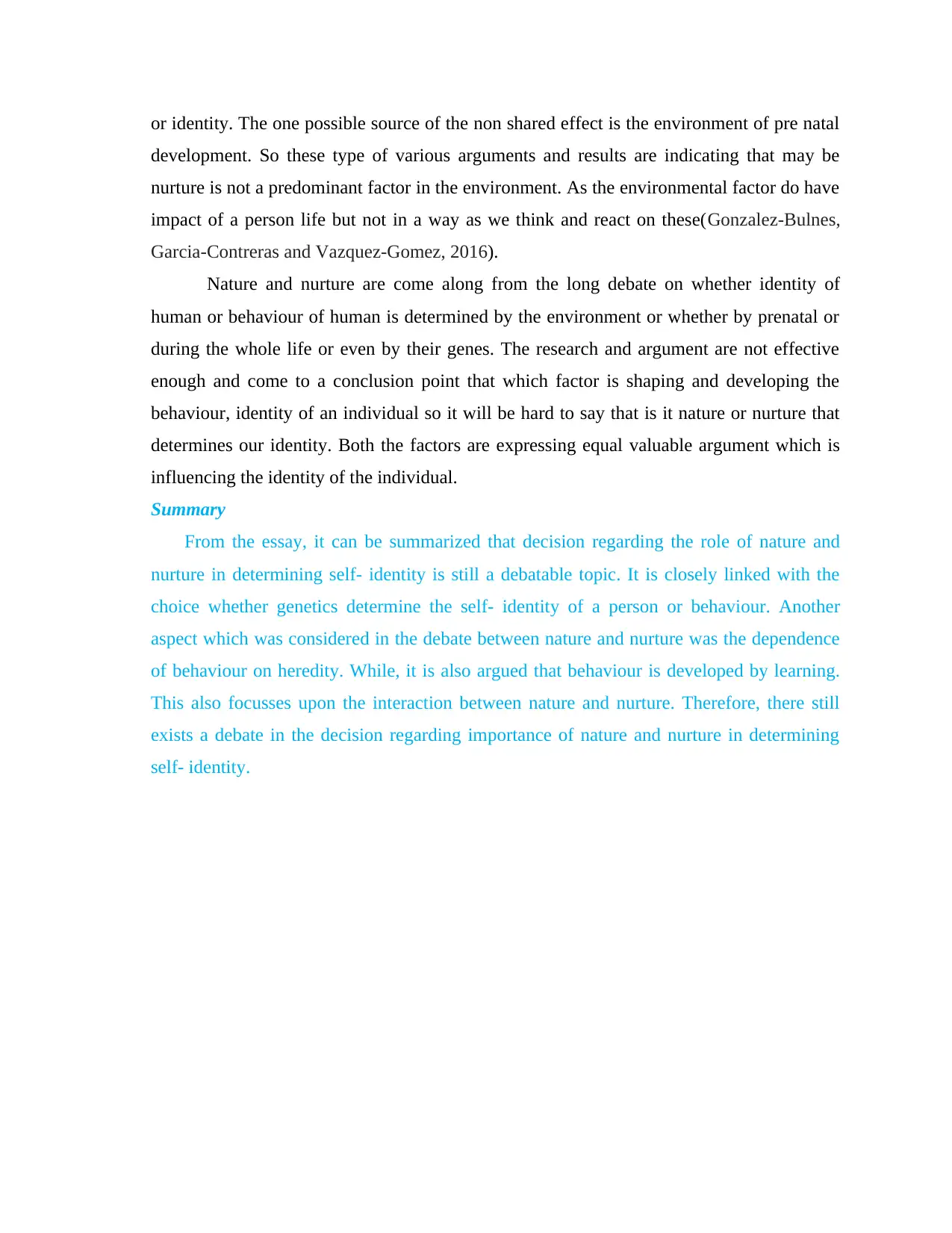
or identity. The one possible source of the non shared effect is the environment of pre natal
development. So these type of various arguments and results are indicating that may be
nurture is not a predominant factor in the environment. As the environmental factor do have
impact of a person life but not in a way as we think and react on these(Gonzalez-Bulnes,
Garcia-Contreras and Vazquez-Gomez, 2016).
Nature and nurture are come along from the long debate on whether identity of
human or behaviour of human is determined by the environment or whether by prenatal or
during the whole life or even by their genes. The research and argument are not effective
enough and come to a conclusion point that which factor is shaping and developing the
behaviour, identity of an individual so it will be hard to say that is it nature or nurture that
determines our identity. Both the factors are expressing equal valuable argument which is
influencing the identity of the individual.
Summary
From the essay, it can be summarized that decision regarding the role of nature and
nurture in determining self- identity is still a debatable topic. It is closely linked with the
choice whether genetics determine the self- identity of a person or behaviour. Another
aspect which was considered in the debate between nature and nurture was the dependence
of behaviour on heredity. While, it is also argued that behaviour is developed by learning.
This also focusses upon the interaction between nature and nurture. Therefore, there still
exists a debate in the decision regarding importance of nature and nurture in determining
self- identity.
development. So these type of various arguments and results are indicating that may be
nurture is not a predominant factor in the environment. As the environmental factor do have
impact of a person life but not in a way as we think and react on these(Gonzalez-Bulnes,
Garcia-Contreras and Vazquez-Gomez, 2016).
Nature and nurture are come along from the long debate on whether identity of
human or behaviour of human is determined by the environment or whether by prenatal or
during the whole life or even by their genes. The research and argument are not effective
enough and come to a conclusion point that which factor is shaping and developing the
behaviour, identity of an individual so it will be hard to say that is it nature or nurture that
determines our identity. Both the factors are expressing equal valuable argument which is
influencing the identity of the individual.
Summary
From the essay, it can be summarized that decision regarding the role of nature and
nurture in determining self- identity is still a debatable topic. It is closely linked with the
choice whether genetics determine the self- identity of a person or behaviour. Another
aspect which was considered in the debate between nature and nurture was the dependence
of behaviour on heredity. While, it is also argued that behaviour is developed by learning.
This also focusses upon the interaction between nature and nurture. Therefore, there still
exists a debate in the decision regarding importance of nature and nurture in determining
self- identity.
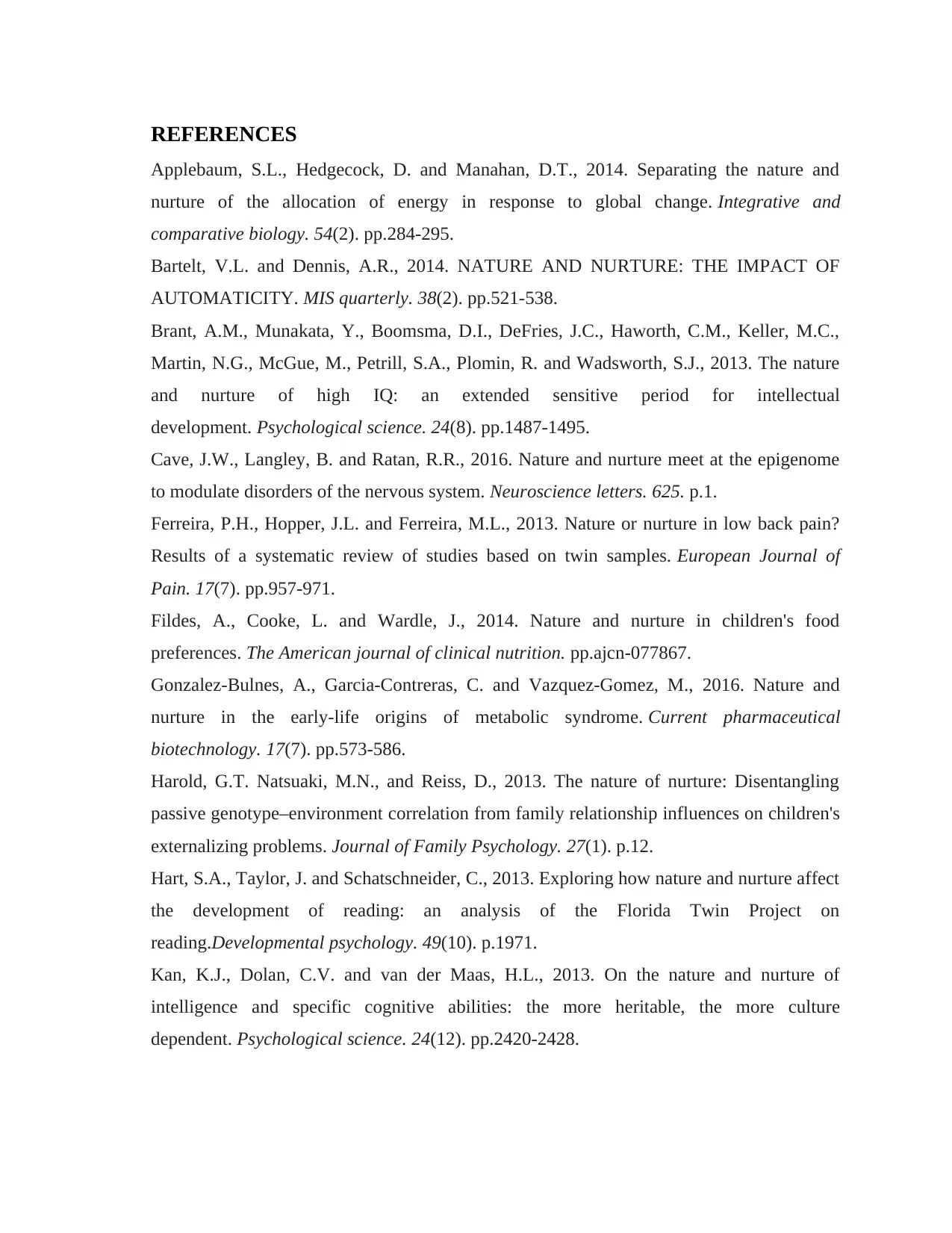
REFERENCES
Applebaum, S.L., Hedgecock, D. and Manahan, D.T., 2014. Separating the nature and
nurture of the allocation of energy in response to global change. Integrative and
comparative biology. 54(2). pp.284-295.
Bartelt, V.L. and Dennis, A.R., 2014. NATURE AND NURTURE: THE IMPACT OF
AUTOMATICITY. MIS quarterly. 38(2). pp.521-538.
Brant, A.M., Munakata, Y., Boomsma, D.I., DeFries, J.C., Haworth, C.M., Keller, M.C.,
Martin, N.G., McGue, M., Petrill, S.A., Plomin, R. and Wadsworth, S.J., 2013. The nature
and nurture of high IQ: an extended sensitive period for intellectual
development. Psychological science. 24(8). pp.1487-1495.
Cave, J.W., Langley, B. and Ratan, R.R., 2016. Nature and nurture meet at the epigenome
to modulate disorders of the nervous system. Neuroscience letters. 625. p.1.
Ferreira, P.H., Hopper, J.L. and Ferreira, M.L., 2013. Nature or nurture in low back pain?
Results of a systematic review of studies based on twin samples. European Journal of
Pain. 17(7). pp.957-971.
Fildes, A., Cooke, L. and Wardle, J., 2014. Nature and nurture in children's food
preferences. The American journal of clinical nutrition. pp.ajcn-077867.
Gonzalez-Bulnes, A., Garcia-Contreras, C. and Vazquez-Gomez, M., 2016. Nature and
nurture in the early-life origins of metabolic syndrome. Current pharmaceutical
biotechnology. 17(7). pp.573-586.
Harold, G.T. Natsuaki, M.N., and Reiss, D., 2013. The nature of nurture: Disentangling
passive genotype–environment correlation from family relationship influences on children's
externalizing problems. Journal of Family Psychology. 27(1). p.12.
Hart, S.A., Taylor, J. and Schatschneider, C., 2013. Exploring how nature and nurture affect
the development of reading: an analysis of the Florida Twin Project on
reading.Developmental psychology. 49(10). p.1971.
Kan, K.J., Dolan, C.V. and van der Maas, H.L., 2013. On the nature and nurture of
intelligence and specific cognitive abilities: the more heritable, the more culture
dependent. Psychological science. 24(12). pp.2420-2428.
Applebaum, S.L., Hedgecock, D. and Manahan, D.T., 2014. Separating the nature and
nurture of the allocation of energy in response to global change. Integrative and
comparative biology. 54(2). pp.284-295.
Bartelt, V.L. and Dennis, A.R., 2014. NATURE AND NURTURE: THE IMPACT OF
AUTOMATICITY. MIS quarterly. 38(2). pp.521-538.
Brant, A.M., Munakata, Y., Boomsma, D.I., DeFries, J.C., Haworth, C.M., Keller, M.C.,
Martin, N.G., McGue, M., Petrill, S.A., Plomin, R. and Wadsworth, S.J., 2013. The nature
and nurture of high IQ: an extended sensitive period for intellectual
development. Psychological science. 24(8). pp.1487-1495.
Cave, J.W., Langley, B. and Ratan, R.R., 2016. Nature and nurture meet at the epigenome
to modulate disorders of the nervous system. Neuroscience letters. 625. p.1.
Ferreira, P.H., Hopper, J.L. and Ferreira, M.L., 2013. Nature or nurture in low back pain?
Results of a systematic review of studies based on twin samples. European Journal of
Pain. 17(7). pp.957-971.
Fildes, A., Cooke, L. and Wardle, J., 2014. Nature and nurture in children's food
preferences. The American journal of clinical nutrition. pp.ajcn-077867.
Gonzalez-Bulnes, A., Garcia-Contreras, C. and Vazquez-Gomez, M., 2016. Nature and
nurture in the early-life origins of metabolic syndrome. Current pharmaceutical
biotechnology. 17(7). pp.573-586.
Harold, G.T. Natsuaki, M.N., and Reiss, D., 2013. The nature of nurture: Disentangling
passive genotype–environment correlation from family relationship influences on children's
externalizing problems. Journal of Family Psychology. 27(1). p.12.
Hart, S.A., Taylor, J. and Schatschneider, C., 2013. Exploring how nature and nurture affect
the development of reading: an analysis of the Florida Twin Project on
reading.Developmental psychology. 49(10). p.1971.
Kan, K.J., Dolan, C.V. and van der Maas, H.L., 2013. On the nature and nurture of
intelligence and specific cognitive abilities: the more heritable, the more culture
dependent. Psychological science. 24(12). pp.2420-2428.
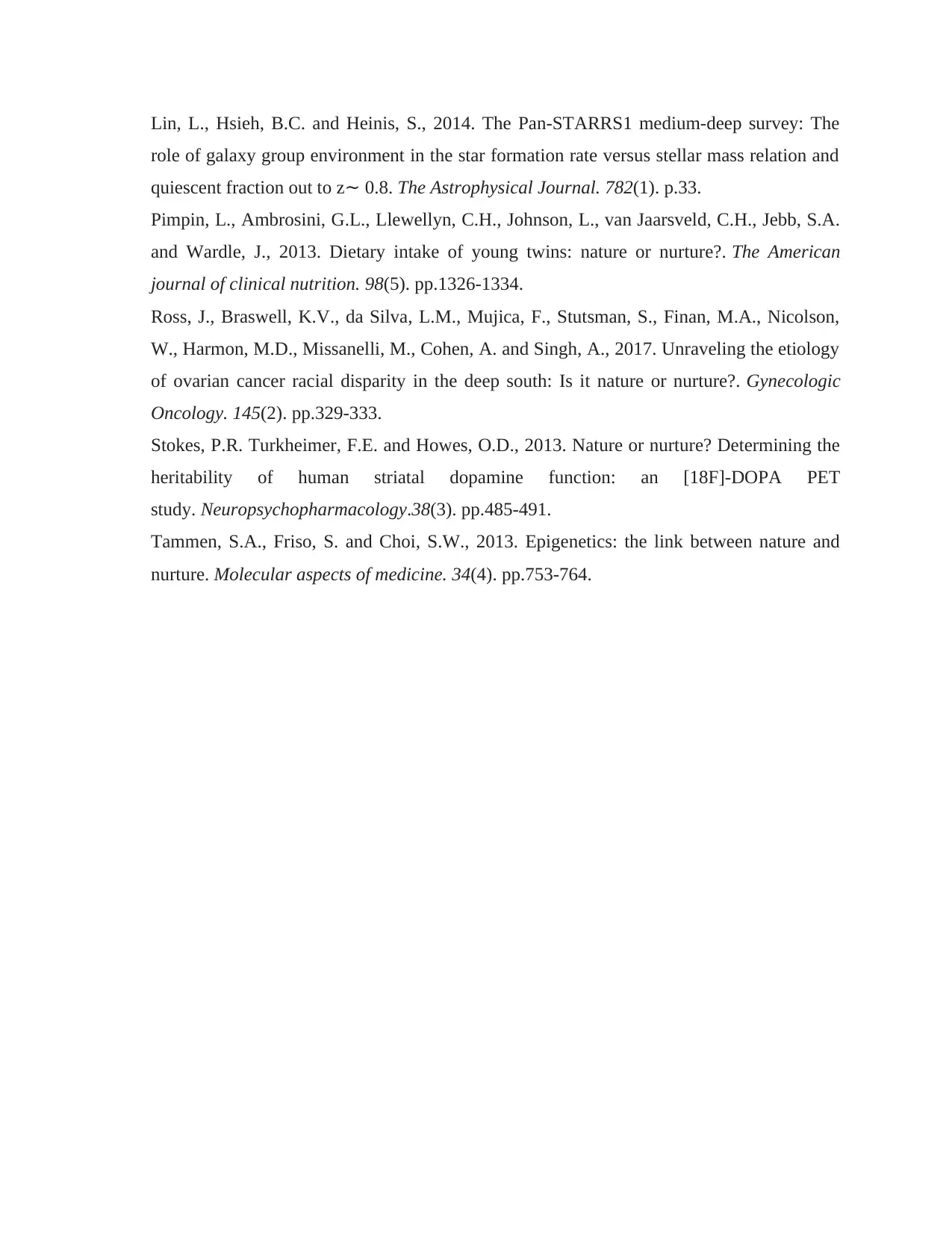
Lin, L., Hsieh, B.C. and Heinis, S., 2014. The Pan-STARRS1 medium-deep survey: The
role of galaxy group environment in the star formation rate versus stellar mass relation and
quiescent fraction out to z 0.8.∼ The Astrophysical Journal. 782(1). p.33.
Pimpin, L., Ambrosini, G.L., Llewellyn, C.H., Johnson, L., van Jaarsveld, C.H., Jebb, S.A.
and Wardle, J., 2013. Dietary intake of young twins: nature or nurture?. The American
journal of clinical nutrition. 98(5). pp.1326-1334.
Ross, J., Braswell, K.V., da Silva, L.M., Mujica, F., Stutsman, S., Finan, M.A., Nicolson,
W., Harmon, M.D., Missanelli, M., Cohen, A. and Singh, A., 2017. Unraveling the etiology
of ovarian cancer racial disparity in the deep south: Is it nature or nurture?. Gynecologic
Oncology. 145(2). pp.329-333.
Stokes, P.R. Turkheimer, F.E. and Howes, O.D., 2013. Nature or nurture? Determining the
heritability of human striatal dopamine function: an [18F]-DOPA PET
study. Neuropsychopharmacology.38(3). pp.485-491.
Tammen, S.A., Friso, S. and Choi, S.W., 2013. Epigenetics: the link between nature and
nurture. Molecular aspects of medicine. 34(4). pp.753-764.
role of galaxy group environment in the star formation rate versus stellar mass relation and
quiescent fraction out to z 0.8.∼ The Astrophysical Journal. 782(1). p.33.
Pimpin, L., Ambrosini, G.L., Llewellyn, C.H., Johnson, L., van Jaarsveld, C.H., Jebb, S.A.
and Wardle, J., 2013. Dietary intake of young twins: nature or nurture?. The American
journal of clinical nutrition. 98(5). pp.1326-1334.
Ross, J., Braswell, K.V., da Silva, L.M., Mujica, F., Stutsman, S., Finan, M.A., Nicolson,
W., Harmon, M.D., Missanelli, M., Cohen, A. and Singh, A., 2017. Unraveling the etiology
of ovarian cancer racial disparity in the deep south: Is it nature or nurture?. Gynecologic
Oncology. 145(2). pp.329-333.
Stokes, P.R. Turkheimer, F.E. and Howes, O.D., 2013. Nature or nurture? Determining the
heritability of human striatal dopamine function: an [18F]-DOPA PET
study. Neuropsychopharmacology.38(3). pp.485-491.
Tammen, S.A., Friso, S. and Choi, S.W., 2013. Epigenetics: the link between nature and
nurture. Molecular aspects of medicine. 34(4). pp.753-764.
1 out of 10
Related Documents
Your All-in-One AI-Powered Toolkit for Academic Success.
+13062052269
info@desklib.com
Available 24*7 on WhatsApp / Email
![[object Object]](/_next/static/media/star-bottom.7253800d.svg)
Unlock your academic potential
© 2024 | Zucol Services PVT LTD | All rights reserved.





